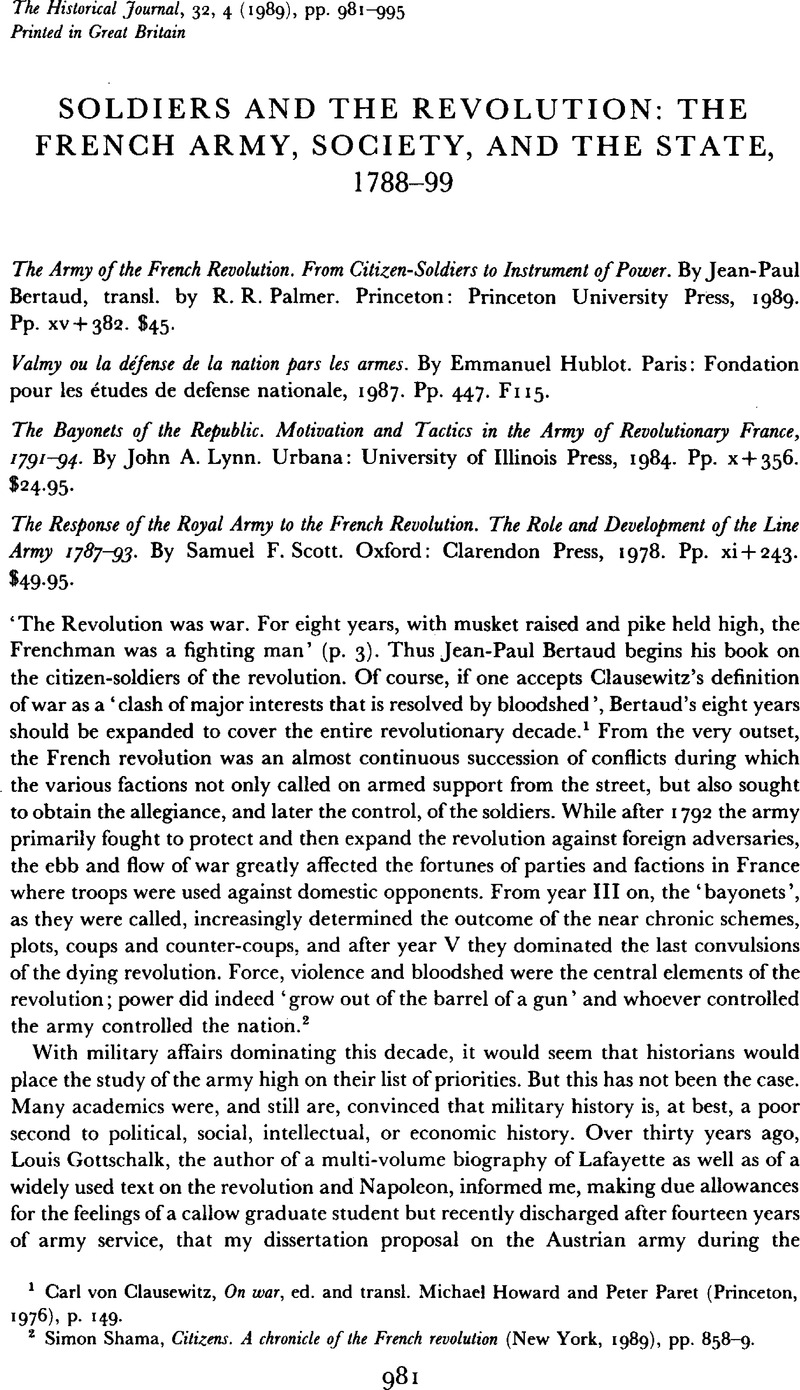Article contents
Soldiers and the Revolution: The French Army, Society, and the State, 1788–99
Published online by Cambridge University Press: 11 February 2009
Abstract

- Type
- Review Articles
- Information
- Copyright
- Copyright © Cambridge University Press 1989
References
1 von Clausewitz, Carl, On war, ed. and transl. Howard, Michael and Paret, Peter (Princeton, 1976), p. 149Google Scholar.
2 Shama, Simon, Citizens. A chronicle of the French revolution (New York, 1989), pp. 858–9Google Scholar.
3 Clausewitz, , On war, pp. 592, 609–10Google Scholar.
4 Delbrück, Hans, Geschichte der Kriegskunst im Rahmen der politischen Geschichte (4 vols., Berlin, 1907–1920)Google Scholar. For the controversy regarding his work see Bucholz, Arden, Hans Delbrück and the German military establishment (Iowa City, 1985), pp. 26–44, 141–5Google Scholar.
5 Vagts, Alfred, A history of militarism (New York, 1937), pp. 21, 32–6Google Scholar; Palmer, Robert R., ‘Frederick the Great, Guibert, Bülow: from dynastic to national war’, in Earle, Edward M. (ed.), Makers of modern strategy (Princeton, 1944), p. 72Google Scholar.
6 Scott, Samuel F., ‘The “new” military history of the revolution’, Proceedings of the Annual Meeting of the Western Society for French History, XII (1984), 92Google Scholar. Cf. Himmelfarb, Gertrude, The new history and the old (Cambridge, 1987)Google Scholar, which does not even list military history among the discipline's special fields.
7 Weigley, Russel F., Eisenhower and his lieutenants (Bloomington, 1980), p. XVGoogle Scholar.
8 Boscher, J. F., The French revolution (New York–London, 1988), p. ixGoogle Scholar.
9 Paret, Peter, ‘Conscription and the end of the old regime in France and Prussia’, in Treue, Wilhelm (ed.), Geschichte als Aufgabe (Berlin, 1988), p. 168Google Scholar.
10 Cohen, Eliot A., Citizens and soldiers (Ithaca, 1985), pp. 79–85. 117–25Google Scholar.
11 Scott, , ‘The “new” military history’, pp. 92–3Google Scholar.
12 Ibid. pp. 93–4; Reinhard, Marcel, Le Grand Carnot (2 vols., Paris, 1950–1952)Google Scholar.
13 Corvisier, André, L'Armée française de la fin du XVIIe siècle au ministère de Choiseul: Le Soldat (2 vols., Paris, 1964)Google Scholar.
14 Scott's picture of the troops is reinforced by the findings of Chagniot, Jean, Paris et l'armée au XVIIe siècle (Paris, 1985)Google Scholar.
15 For instance Schama, , Citizens, p. 902Google Scholar.
16 A point emphasized by Wohlfeil, Rainer, Vom stehenden Heer des Absolutismus zur allgemeinen Wehrpflicht, vol. 11 of Handbuch zur duetschen Militärgeschichte 1648 bis 1939 (Frankfurt a.M., 1964), p. 35Google Scholar.
17 Paret, Peter, ‘The history of war’, Daedalus, c (1973), 376Google Scholar.
18 For American troop motivation Lynn relied on the work of, among others S. L. A. Marshall which has been strongly questioned. For a summary of this controversy see Spiller, Roger K., ‘S. L. A. Marshall and the ratio of fire’, RUSI Journal, CXXXIII (Winter 1988), 63–71CrossRefGoogle Scholar. A more recent study on the German army in the Second World War suggests that political indoctrination played a greater role than was previously thought. See Nittner, Ernst, ‘Menschenführung im Heer der Wehrmacht und im Zweiten Weltkrieg’, Militärgeschichtliches Forschungsamt, Menschenführung im Heer (Herford–Bonn, 1982), pp. 176–7Google Scholar. On the other hand, a psychological assessment of the Israeli soldier reasserts the universal and paramount importance of small group cohesion: Gal, Reuven, A portrait of the Israeli soldier (New York–Westport–London, 1986), pp. 234–6Google Scholar.
19 A view advanced, among others, by Chandler, David G., The campaigns of Napoleon (New York–Westport–London, 1986), pp. 66–8Google Scholar. The quote here is from Howard, Michael, War in European history (Oxford, 1977), p. 79Google Scholar.
20 Rothenberg, Gunther E., The art of warfare in the age of Napoleon (London, 1977), pp. 67, 114–16Google Scholar.
21 Paret, , ‘Conscription’, p. 169, n. 8Google Scholar.
22 Schama, , Citizens, p. 858Google Scholar.
23 Rothenberg, Gunther E., ‘The Archduke Charles and the question of popular participation in war’, Consortium on Revolutionary Europe, Proceedings 1982 (Athens, Georgia, 1983), pp. 214–24Google Scholar.
- 1
- Cited by




